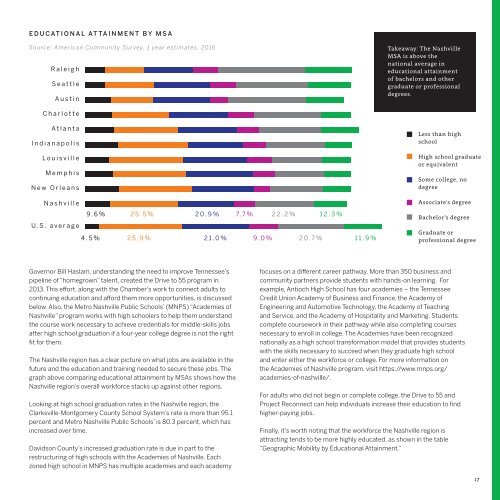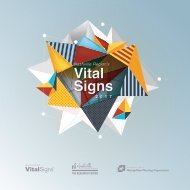VitalSigns-2018
Create successful ePaper yourself
Turn your PDF publications into a flip-book with our unique Google optimized e-Paper software.
EDUCATIONAL ATTAINMENT BY MSA<br />
Source: American Community Survey, 1 year estimates, 2016<br />
Raleigh<br />
Seattle<br />
Austin<br />
Takeaway: The Nashville<br />
MSA is above the<br />
national average in<br />
educational attainment<br />
of bachelors and other<br />
graduate or professional<br />
degrees.<br />
Charlotte<br />
Atlanta<br />
Indianapolis<br />
Louisville<br />
Memphis<br />
New Orleans<br />
Nashville<br />
9.6% 25.5% 20.9% 7.7 % 22.2% 12.3%<br />
U.S. average<br />
4.5% 25.9% 21.0% 9.0% 20.7% 11.9%<br />
Less than high<br />
school<br />
High school graduate<br />
or equivalent<br />
Some college, no<br />
degree<br />
Associate’s degree<br />
Bachelor’s degree<br />
Graduate or<br />
professional degree<br />
Governor Bill Haslam, understanding the need to improve Tennessee’s<br />
pipeline of “homegrown” talent, created the Drive to 55 program in<br />
2013. This effort, along with the Chamber’s work to connect adults to<br />
continuing education and afford them more opportunities, is discussed<br />
below. Also, the Metro Nashville Public Schools’ (MNPS) “Academies of<br />
Nashville” program works with high schoolers to help them understand<br />
the course work necessary to achieve credentials for middle-skills jobs<br />
after high school graduation if a four-year college degree is not the right<br />
fit for them.<br />
The Nashville region has a clear picture on what jobs are available in the<br />
future and the education and training needed to secure these jobs. The<br />
graph above comparing educational attainment by MSAs shows how the<br />
Nashville region’s overall workforce stacks up against other regions.<br />
Looking at high school graduation rates in the Nashville region, the<br />
Clarksville-Montgomery County School System’s rate is more than 95.1<br />
percent and Metro Nashville Public Schools’ is 80.3 percent, which has<br />
increased over time.<br />
Davidson County’s increased graduation rate is due in part to the<br />
restructuring of high schools with the Academies of Nashville. Each<br />
zoned high school in MNPS has multiple academies and each academy<br />
focuses on a different career pathway. More than 350 business and<br />
community partners provide students with hands-on learning. For<br />
example, Antioch High School has four academies – the Tennessee<br />
Credit Union Academy of Business and Finance, the Academy of<br />
Engineering and Automotive Technology, the Academy of Teaching<br />
and Service, and the Academy of Hospitality and Marketing. Students<br />
complete coursework in their pathway while also completing courses<br />
necessary to enroll in college. The Academies have been recognized<br />
nationally as a high school transformation model that provides students<br />
with the skills necessary to succeed when they graduate high school<br />
and enter either the workforce or college. For more information on<br />
the Academies of Nashville program, visit https://www.mnps.org/<br />
academies-of-nashville/.<br />
For adults who did not begin or complete college, the Drive to 55 and<br />
Project Reconnect can help individuals increase their education to find<br />
higher-paying jobs.<br />
Finally, it’s worth noting that the workforce the Nashville region is<br />
attracting tends to be more highly educated, as shown in the table<br />
“Geographic Mobility by Educational Attainment.”<br />
17



